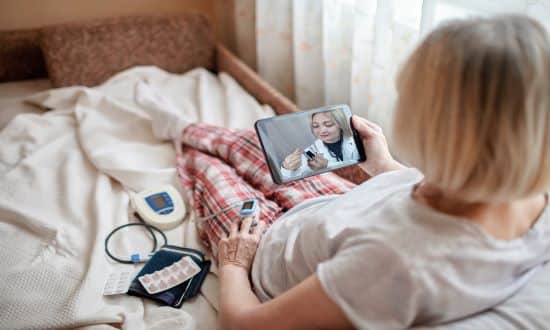The term virtual wards can be ‘misleading’ say panel at King’s Fund event
- 16 October 2023

The term virtual wards can be “misleading” as it implies the involvement of virtual reality and high-level technology, speakers told a session at The King’s Fund’s Digital Health and Care Congress Thursday.
In the opening session of the event, titled ‘Ensuring digital health care works for people who draw on services’, the panel unanimously agreed that the term ‘virtual wards’ is not the most appropriate for what is actually a low technology solution.
Jacob Lant, chief executive of National Voices, pointed out that “some prefer the term ‘hospital at home’ as it is a very low tech solution”.
He was joined by Helen Dobson, managing director at Citizens Online, who stressed that she wants “technology to be positive, not further exclude people”, and that we therefore “need to involve people who don’t use technology every day in the design”.
Lant shared the same viewpoint, telling the audience in London that “there’s a huge potential for virtual wards to free up beds” but there is “very little patient interaction to find out how it’s working” and therefore the “culture should be to involve [the public] in creating and monitoring digital technology”.
Both Lant and Dobson were on the panel alongside Graham Prestwich, public and patient engagement lead at Health Innovation Yorkshire and Humber, Lee Rickles, chief information officer at Humber and North Yorkshire Integrated Care System, and Vic Rayner chief executive of the National Care Forum, who joined virtually.
Rayner said the expectation to increase virtual wards is ambitious, but if it is to be achieved, it is “important that we skill up staff and pay them properly to deliver care at home and support individuals”.
The interim director for transformation at NHS England Dr Vin Diwakar, who last spoke at the end of September at HETT 2023, was due to appear at The King’s Fund during the morning of the opening day but was a late withdrawal, as rumours of a FDP tender announcement swirl.





1 Comments
Totally agree.
Most VW’s participants use simple low tech monitoring kit to manually measure parameters and then ‘sense’ them in via various means. The single point of failure is the patient themselves inputting wrong data, keystroke mistakes etc etc.
For correct clinical decision support, you need accurate physiological data live or via batched auto uploads, take the SPF out of the equation at source.
Currently, how many of these systems are in place? Very few. We have a long way to go…
Comments are closed.